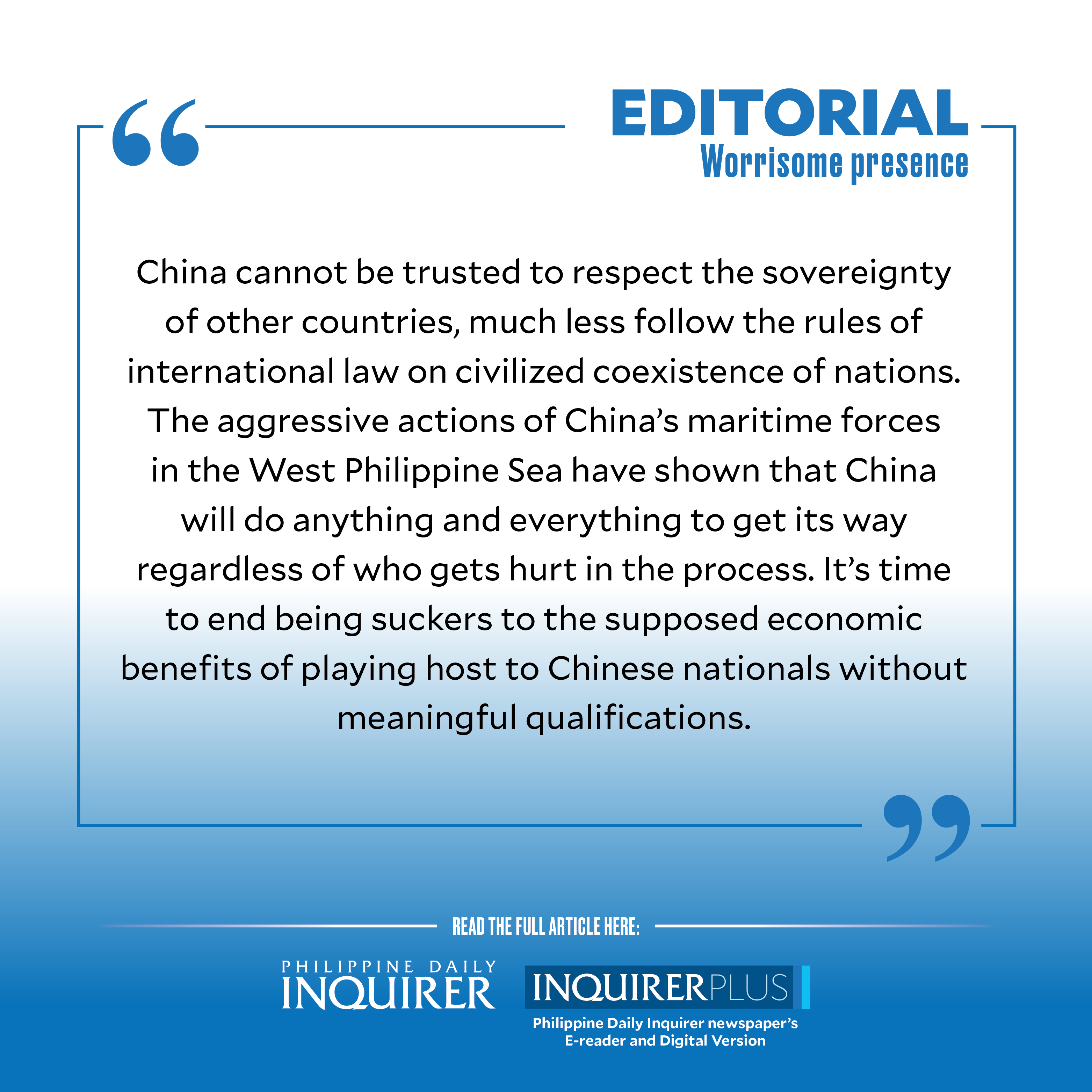Worrisome presence
Better late than never.
That best describes the decision of the Department of Foreign Affairs (DFA) to implement stricter rules on the issuance of tourist visas to Chinese nationals in the wake of reports that fraudulently-obtained passports and visas had resulted in their illicit entry and overstay.
Its action is long overdue in light of the crimes of human trafficking, forcible abduction, robbery extortion, and homicide that had earlier been committed by Chinese nationals who were allowed entry into the country to operate Philippine offshore gaming operator (Pogo) companies.
It took recent reports that more than a thousand Chinese students are enrolled in Cagayan, for the DFA to undertake to review its liberal policy on visa issuance to Chinese nationals, which was characteristic of the past administration’s slavish attitude toward China.
Paradigm shift
With the Marcos administration’s 180-degree turn in dealing with China, the DFA and the Bureau of Immigration (BI), which can issue certain visas to foreigners, can now do a paradigm shift on how to manage the entry of Chinese nationals.
They have used tourist visit, prearranged employment, and enrollment in local schools as the means by which they have been able to legitimize their entry and continued stay.
The tourism route has, for years, been conveniently used by thousands of Chinese nationals to work in Pogos and, in the process, engage in illegal activities involving their own compatriots and people of other nationalities.
To aggravate matters, the tourism-related spending by true tourists is not something to crow about financially since the travel arrangements of this kind of tourists are pre-packaged in China and so the bulk of their revenues stay there.
Prearranged employment
Aside from the “sightseeing” excuse, Chinese nationals have used supposedly prearranged employment contracts to obtain work visas (or 9G visa) that allow them to be employed in the country for indefinite periods of time.
In January, Justice Secretary Jesus Crispin Remulla reported that his department was investigating several immigration staff for involvement in the issuance of prearranged employment visas to 459 foreigners in fake Philippine companies.
He said that more than 500 fake corporations could be involved, many of which were Pogo companies.
From the initial investigation, it appeared that those personnel did not verify the authenticity of the alleged corporations and took hook, line, and sinker the claims of prearranged employment.
This oversight (deliberate?) does not come as a surprise in light of the “pastillas” scam uncovered in 2020 where several BI officials and employees were found to have allowed more than a hundred foreign nationals, mostly Chinese, to enter the country without undergoing the usual screening process in exchange for hefty bribes.
Student visas
Another modus of Chinese nationals in entering the country is through the student visa route.
According to the BI, last year, some 16,200 Chinese nationals came in as tourists and later applied (and were given) student visas that enabled them to enroll in the country’s colleges and universities. Of this number, 1,516 are enrolled in Cagayan.
This conversion facility is made possible by an executive order issued by then President Joseph Estrada in 2000.
Under normal circumstances, the presence of those Chinese nationals in Cagayan should not be a cause for concern. It may even be looked at as a source of pride about the quality of education in the northern part of the country.
But in light of the present tension between the Philippines and China over maritime issues, and the contest for hegemony between China and the United States over this part of the world, their presence in Cagayan has raised national security concerns since it is one of the places where the Philippines has allowed US troops to be stationed.
Intelligence-gathering purposes
No doubt, these students (assuming they really are) are young, able-bodied, and skilled in state-of-the-art technology that can be used for intelligence-gathering purposes.
Given the scenarios described above, the question is posed: Is there reason to be concerned of or, worse, be paranoid, about the inordinate presence of Chinese nationals in the country?
Yes! Because China cannot be trusted to respect the sovereignty of other countries, much less follow the rules of international law on civilized coexistence of nations.
The aggressive actions of China’s maritime forces in the West Philippine Sea have shown that China will do anything and everything to get its way regardless of who gets hurt in the process.
It’s time to end being suckers to the supposed economic benefits of playing host to Chinese nationals without meaningful qualifications.





















